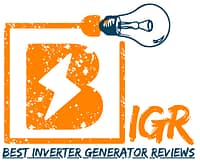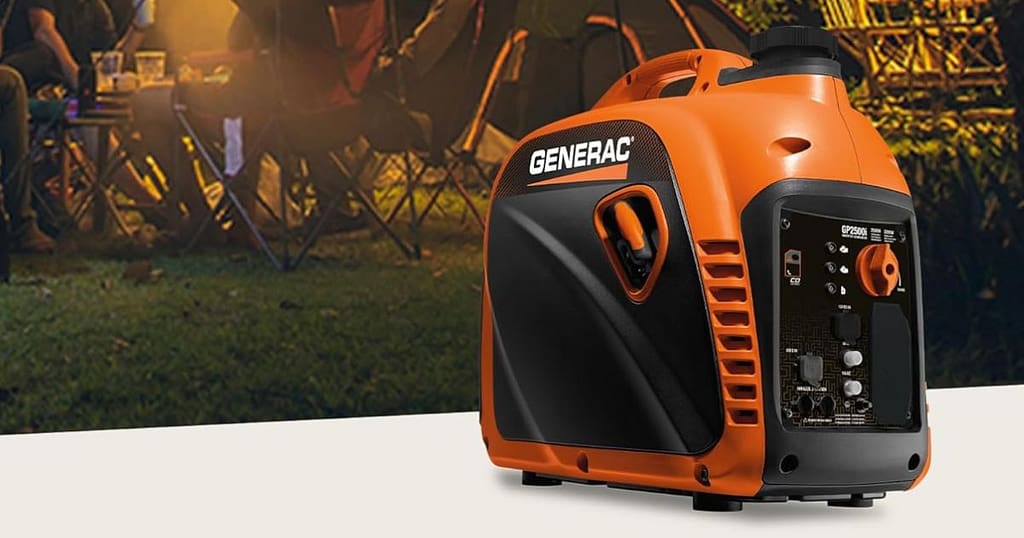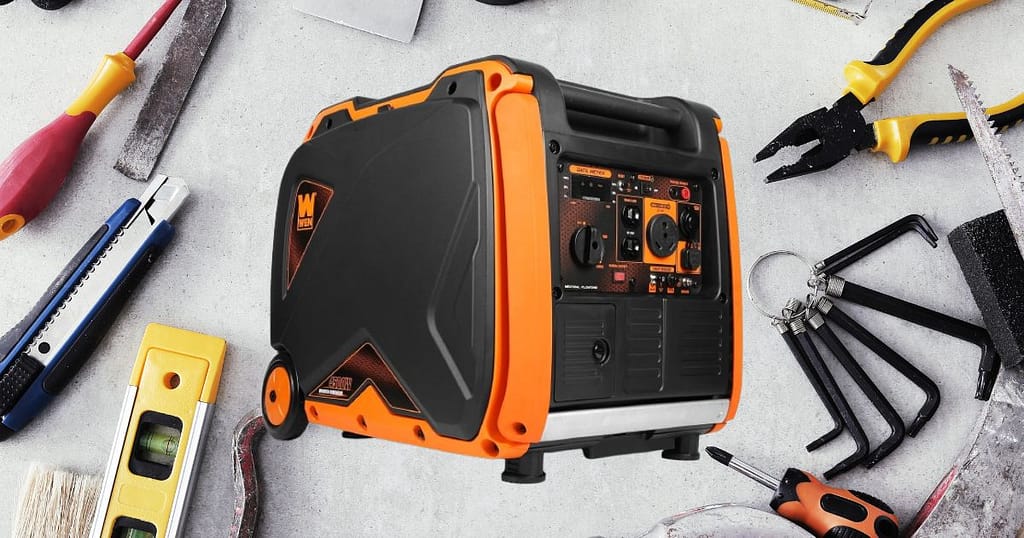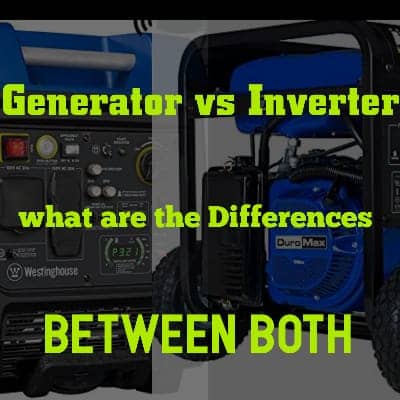Benefits of Inverter Generator as Home backup power in 2023
Power outages are becoming more frequent, and they can occur at any time of the day or night, for various reasons. When the power goes out, your daily routine can be disrupted, and you might not be able to perform some essential tasks, like cooking, heating, or charging your phone. That’s why it’s important to have a backup power source to keep your home running during power outages. Inverter generators are a popular choice for backup power because of their portability, efficiency, and quiet operation.
In this blog post, we will discuss the benefits of using an inverter generator as a backup power source for your home and provide tips on how to choose the right one for your needs. Also, we’ll tell you how can you maintain your inverter generator!
What is an inverter generator?
An inverter generator is a type of generator that produces high-quality electricity with low Total Harmonic Distortion (THD). The THD measures the cleanliness of the power generated by the generator, and low THD means that the power is stable and safe for sensitive electronic devices like smartphones, laptops, and TVs.
Inverter generators use advanced technology to produce electricity, and they are designed to be compact, lightweight, and energy-efficient. They typically use a smaller engine than conventional generators and can adjust their engine speed to match the power demand, which saves fuel and reduces noise.
Benefits of Inverter Generator as Home backup power
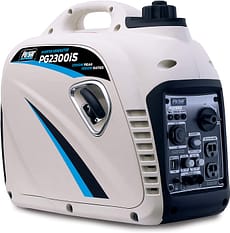
Benefits of using an inverter generator as a backup power source for your home
Portability:
Inverter generators are compact and lightweight, which makes them easy to transport and store. You can move them around your home or take them with you on outdoor trips or camping trips.
Fuel-efficient:
Inverter generators can adjust their engine speed to match the power demand, which reduces fuel consumption and extends the runtime. They are also designed to be energy-efficient, which means that they can produce more power with less fuel.
Low noise:
Inverter generators are quieter than conventional generators because they use a smaller engine and advanced technology to produce electricity. They are ideal for use in residential areas where noise restrictions apply.
Safe for sensitive electronic devices:
Inverter generators produce clean and stable power with low THD, which makes them safe for sensitive electronic devices like smartphones, laptops, and TVs. You can use them to power your home appliances without worrying about damaging them.
Easy to maintain:
Inverter generators require less maintenance than conventional generators because they have fewer moving parts and are designed to be energy-efficient. They also have a longer lifespan and are less prone to breakdowns.
How can choose an accurate inverter generator for your needs
Choosing the right inverter generator for your needs is an important decision that requires careful consideration of various factors. Inverter generators are becoming increasingly popular due to their compact size, quiet operation, and fuel efficiency. Here are some important factors to consider when choosing the right inverter generator for your needs.
Power output:
The power output of the inverter generator is one of the most important factors to consider. You need to determine your power needs by adding up the wattage of the appliances you want to power. You can find the wattage information on the label of the appliance or in the owner’s manual. Once you have added up the wattage, add a buffer of 10-20% to account for power surges. This will give you the minimum power output you need from the generator.
Runtime:
The runtime of the inverter generator is also an important factor to consider. The runtime will depend on the fuel tank capacity and the fuel consumption rate. You can calculate the runtime by dividing the fuel tank capacity by the fuel consumption rate. A longer runtime is preferable if you plan to use the generator for longer periods of time without refueling.
Portability:
Portability is also an important factor to consider when choosing an inverter generator. Look for a generator with a compact design and a lightweight construction if you need to transport it frequently. Some generators come with handles or wheels for easy transport. If you plan to store the generator for long periods, look for one with a compact design that will not take up too much space.
Noise level:
Inverter generators become most popular power source by their quiet operation and they are known for their low dba. But there are models which are more quieter than others.
Look for a generator with a noise level of 55 decibels or lower. This will allow you to use the generator in residential areas without disturbing your neighbors.
Price:
The price of the inverter generator should fit your budget. Inverter generators come in different price ranges, so you should choose one that offers the best value for your money. Consider the features and specifications of each generator and choose the one that meets your needs and fits your budget.
In conclusion, choosing the right inverter generator for your needs requires careful consideration of various factors. You need to determine your power needs, consider the runtime, portability, noise level, and price of each generator. By considering these factors, you can choose the best inverter generator that meets your needs and fits your budget.
Maintaining your inverter generator for optimal performance
Inverter generators have revolutionized the world of power generation, providing portable and efficient sources of electricity that can be used in a variety of applications. They are commonly used for outdoor recreational activities, powering RVs, as backup power for homes during power outages, and even for construction sites. Inverter generators are known for their quiet operation, fuel efficiency, and reliability. However, like any piece of machinery, they require regular maintenance to ensure optimal performance and longevity..
Read the Owner’s Manual
In order to keep your inverter generator running smoothly and to prevent damage or accidents, it is important to follow the manufacturer’s recommended maintenance procedures. The best source of information for these procedures is the owner’s manual.
The owner’s manual provides a detailed guide for operating, maintaining, and troubleshooting your inverter generator. It typically includes a description of the different components of the generator, such as the engine, fuel tank, oil filter, spark plug, and air filter. It also explains how to check and replace these components when necessary. Additionally, the manual outlines the recommended oil type, oil change frequency, fuel type, and fuel tank capacity.
Reading the owner’s manual is crucial because it provides safety precautions and guidelines for using the generator, which is essential for preventing accidents or injury. The manual may include warnings and safety tips such as:
- Proper grounding procedures
- The proper way to store and transport the generator
- Tips for avoiding carbon monoxide poisoning
- Instructions for the inverter generator starting and stopping
- Instructions for using the generator with extension cords or appliances
- How to troubleshoot common issues
By familiarizing yourself with these safety precautions and operating instructions, you will be able to avoid damage to your inverter generator and ensure that it runs efficiently. Neglecting maintenance and ignoring the owner’s manual can result in expensive repairs or even permanent damage to the generator.
In summary, the owner’s manual is an essential tool for maintaining and operating your inverter generator. It provides important information on how to safely operate and maintain the generator, which can help you avoid accidents, keep the generator running efficiently, and prolong its lifespan. So, be sure to read the manual carefully and follow the manufacturer’s recommended maintenance procedures.
Change the Oil Regularly
Inverter generators require regular oil changes to ensure optimal performance and longevity. The frequency of oil changes varies depending on the make and model of the generator, but a good rule of thumb is to change the oil every 50-100 hours of operation or at least once per year, whichever comes first. Check the owner’s manual for the specific oil change interval for your generator. When changing the oil, use the recommended oil type and grade specified in the owner’s manual.
Clean the Air Filter
The air filter on your inverter generator helps prevent dirt and debris from entering the engine, which can cause damage and decrease performance. A dirty air filter can reduce airflow to the engine, causing it to run poorly or even stall. Check the air filter regularly and clean it as necessary. Some generators have foam filters that can be washed with soap and water, while others have paper filters that must be replaced.
Check and Replace Spark Plugs
Checking and replacing spark plugs in an inverter generator is that the condition of the spark plug can indicate potential problems with the generator’s engine. For example, a spark plug that is excessively dirty or worn may suggest that the engine is running too rich, while a spark plug with a white or light gray deposit could indicate that the engine is running too lean. By regularly checking the spark plug and noting any unusual deposits or wear patterns, you can potentially diagnose engine issues early and address them before they cause more significant problems.
Check and Adjust the Carburetor
The carburetor on your inverter generator mixes fuel and air to create the combustible mixture that powers the engine. A dirty or misadjusted carburetor can cause poor performance or even engine damage. Check the carburetor regularly and adjust it as necessary. This task may be best left to a professional technician, especially if you are not familiar with carburetor adjustment.
Drain the Fuel System
If you are storing your inverter generator for an extended period, it is important to drain the fuel system. Fuel can deteriorate over time and cause problems with the engine, such as clogged fuel lines or carburetor jets. Drain the fuel tank and run the engine until it stalls to remove any remaining fuel from the system.
Store the Generator Properly
Proper storage of your inverter generator can help prevent damage and ensure that it is ready to use when you need it. Store the generator in a clean, dry place away from moisture and direct sunlight. Cover it with a breathable cover to protect it from dust and debris. Before storing the generator, clean it thoroughly and remove any dirt or debris.
In conclusion, maintaining your inverter generator is essential to ensure optimal performance and longevity. Regular oil changes, cleaning the air filter, checking and replacing spark plugs, adjusting the carburetor, draining the fuel system, and proper storage are all critical maintenance tasks. By following these tips, you can help ensure that your inverter generator provides reliable and efficient power for years to come.
